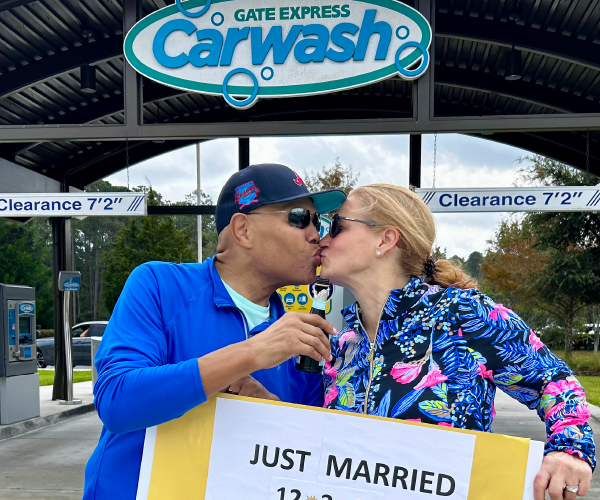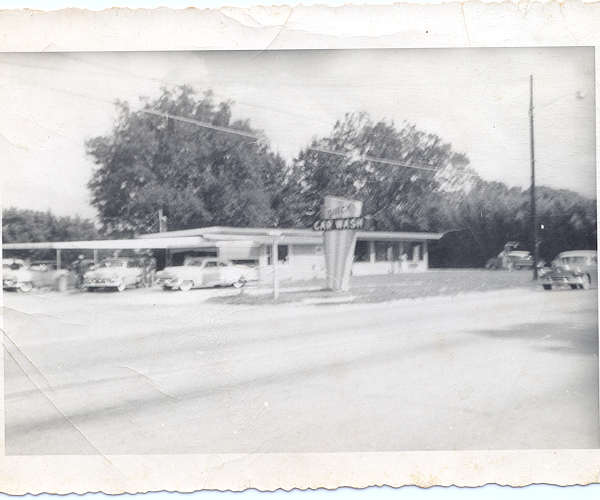
Cross-Industry Inspirations
March 14, 2023
9 minute ReadBy Mary Lou Jay
Every type of business has its unique problems and opportunities, but at the core all share at least a few common concerns. Someone from a manufacturing or logistics background who has developed a good approach for dealing with customer demands or improving operational efficiency can often take what they’ve learned and successfully use the underlying principles in a retail or service setting.
Here’s how four leaders of car wash companies have leveraged their previous experiences in other industries to inform and improve their current businesses’ operations.
Building customer relationships
Now CEO of EverWash, Scott Caplan at one time owned several gyms in Philadelphia and
New Jersey. He remains an investor in a national fitness chain.
As a frequent car wash customer, Caplan recognized the industry’s similarities to fitness centers years before he joined EverWash. But there was one big difference. “I noticed in car washes there was really no customer relationship. They never knew my name; they never knew anything about me. They would just give me a coupon for my next visit,” he said. “I kept thinking that this business just doesn’t seem like they’re doing it right.”
So when he and a partner founded EverWash, they looked for ways to create that more personalized experience with trial memberships and family discounts. “In the gym, what we’re trying to do is get to know these people and get them used to coming to the gym and creating a habit,” Caplan said. “It’s the same thing in the car wash space; you’re trying to get somebody that may have come to the car wash a few times a year to now come three times a month. You’re trying to change people’s behavior. By giving them a trial, you’re essentially saying, ‘Try before you buy, we’re going to show you why we are the best gym or we’re the best car wash in the neighborhood.’”
Caplan noted that car washes, like gyms, have fixed costs that change very little whether there are 10 or 100 people using the facility. Also, car wash member programs, like gym memberships, help create a consistent revenue flow and a consistent customer base, enabling car washes to customize their experiences to better fit their members' preferences.
Creating a standout customer experience can mean upping your amenities and offering perks, too, which was something Caplan learned to appreciate while working in the fitness industry. He said that in a fitness center, that means options such as juice bars and TVs. In car washes, that could mean adding new lighting in tunnels to showcase the equipment, using good-smelling soaps, or adding freebie zones with window washing supplies.

Applying lean principles
ICA member Chris Andersen spent almost 20 years in manufacturing at Hilti, Mark VII Equipment and the Marmon Group before becoming vice president of business development at GO Car Wash. While the terminology in manufacturing and car wash is different, he has found they share goals like eliminating waste, maximizing throughput and continuously improving operations.
“In manufacturing, there’s total quality management, just-in-time manufacturing and lean processes, which are all extremely relevant to operating a car wash, too,” he said. “In car wash, we talk in terms of how we can process more customers. How can we ensure that we’re getting the quality that we need at the other end of the car wash? How can we keep the customer happy? Everything is put in customer terms, like satisfying and delighting our customers, as opposed to using concepts like just-in-time manufacturing or continuous improvement.”
There are parallels in practices, too. For example, when one manufacturing business was having trouble achieving its desired throughput, Andersen said his managers analyzed each stage of the process to determine where the bottlenecks were. They found that by prebuilding some parts of the product, they could eliminate the backups.
Analyzing processes in a car wash to identify slow spots can lead to operational improvements as well, Andersen said. “Maybe we need to add an extra pay station, maybe we need to focus more on members, who flow through much better than your typical retail customer because they don’t have to stop at a pay station.”
Another example from lean manufacturing is level loading —moving some activities to timeframes when there’s less work in order to use resources more effectively. “We do that in a car wash when we have two dollars off on a Wednesday morning; we’re trying to level load our customers, to be able to most efficiently use not only our people on site, but also the capital assets that we have in the car wash,” he said.
Anderson has also incorporated customer service ideas learned from other industries. As a group leader for Backroads Active early in his career, Andersen’s goal was always to create such a good customer experience on the trips to Europe and South American that the people in his group would want to travel with him again. “There was a large incentive to be able to get repeat business and to be really customer-focused. I think that’s the same thing with car wash; every time a customer comes in, it’s the moment of truth, where we could delight that customer, or we could give them a disappointing experience. We know if they get that disappointing experience, they’re not coming back. If we delight them, we’ve got another shot of getting more of their business, and then if we can really put it over the top, that’s where we can start talking about memberships. So it’s all about creating that customer experience and making sure they come back again.”

Core values and common vision
Before joining True Blue Car Wash as CEO in 2019, ICA member Stuart Crum served in management positions in several multi-site, automotive-related businesses, including Jiffy Lube International, Bridgestone Retail Operations and Service King Collision Repair. He said the basics of process systems and customer service in car washes are the same as they are in other multi-site operations.
“Coming in at a senior level, I’ve seen that having strong financial acumen, strong leadership and understanding process and systems to help your team work through problems are important to grow a chain of whatever business you’re running,” Crum said.
Crum applied what he learned about leadership and team building in other businesses to car wash. When he took over at True Blue, for example, he asked his leadership team to identify the company’s vision, purpose and core values. “We use that as a platform to build and scale from,” he said.
During his time at Jiffy Lube, Crum realized the importance of a consistent, scalable playbook across all sites. Developing that playbook early in the business enables a company to bring on new locations and grow quickly. “Companies that don’t have that end up struggling quite a bit, because you end up having one part of the company operating one way and another part in another area operating a different way,” he said.
Although regional differences can impact some operations, Crum believes 90% of the procedures that every location uses should be consistent best practices for everything from hiring and firing employees to cash handling procedures and vehicle loading. That kind of consistency is important however large or widespread the company grows.
Learning how to communicate effectively with customers is also a cross-industry priority. In previous roles, Crum observed the importance of salespeople creating good customer experiences through verbal interactions. In a car wash, where many employees don’t get to talk to customers, some adaptations had to be made to achieve this — non-verbal communication. When customers enter the tunnels, employees should understand the importance of clear, non-verbal communications.
“A smile or thumbs up still means a lot to customers. It’s recognition that we appreciate you being here, a way of saying thanks so much for your business without actually saying it,” he said.
“Without that acknowledgement, customers may choose to go elsewhere because they don’t feel like they’re appreciated or getting good customer service.”
Using Diversity for Unity
The leadership team at Mammoth Holdings also comes from a variety of backgrounds, from Apple to Crane, Pilot to Petco and International Paper to Brinker. It’s something Mammoth promotes as one of its strong points, as this diversity in management has helped the company with unity in its vision and bringing out the best in everyone.
“No matter what country or culture you operate in, it’s up to company leaders to bring the best people together and mobilize them to drive a common vision,” said ICA member David Hoffman, chairman and CEO of Mammoth Holdings. “When you can surround yourself with great talent and great values and behaviors, then anything is possible. It’s all about putting the right teams together at multiple levels within the organization and then creating an environment where you can draw the best out of each other to drive the company forward.”
Before joining Mammoth, Hoffman was CEO of Dunkin’ Brands. Previous to that, he worked for McDonalds for more than two decades, spending 12 of those years in Asia running operations in over 40 different countries.
Hoffman’s experience with these iconic American businesses and the management team’s diverse background have shaped the vision for Mammoth, which currently has 17 different brands. “Going forward, we will at some point unify all these brands toward a single national brand strategy … It will be great for our culture and community within Mammoth, and great for our customers.”
Adapting practices learned in one industry to a new one could be considered a form of innovation — and Hoffman believes that innovation is essential to attracting and retaining customers. “Our entrepreneurial spirit is what drives us forward to continue to evolve. That’s what I see from our Mammoth teams — that entrepreneurial spirit and their willingness to stay relevant with the changing consumer landscape. For us at Mammoth, the ability to innovate will touch everything from data analytics to digital transformation to customer loyalty and ultimately excellence at the wash. We need to continually ask, ‘How do we differentiate ourselves in the eyes of the consumer?’” he said.
Different Strategies for Surviving Downturns
Even the best-run car washes can have difficulty during an economic downturn. These leaders’ differing experiences with the 2007-2008 recession influenced their perceptions of the best strategies to approach them.
Chris Andersen of GO Car Wash was working with a construction-related software business when the 2007-2008 recession began. “Overnight, our market got chopped in half,” he recalled. “So we focused on doing what we already did well and just did it better. We didn’t introduce a lot of new concepts or new products, and we controlled costs.”
Stuart Crum of True Blue Car Wash believes realistic planning is crucial to limiting the impact of an economic slowdown. Anticipating rapid growth, one company he worked for had added a significant amount of overhead. When that didn’t happen, the company had a few rounds of layoffs. “It was very, very painful,” he said. “I’m very cognizant of the fact that you can’t have too few people supporting a business, but you can have too many people. That puts a stranglehold on the business, because you’re going to need more cash than the business actually has.”
Scott Caplan of EverWash, who opened three gyms in 2008, has a different take. “Recessions are difficult for some people, but there’s still a huge opportunity for people that are set up correctly to continue to grow and expand,” he said. The reduced cost of real estate, the discounts on equipment and the availability of contractors made this a good time to move forward, he said.
David Hoffman of Mammoth Holdings, who has led other organizations through many such crises, sees the benefits of this approach. During a downturn, organizations first need to ask themselves if they are managing risks appropriately, and if so, are they capturing the opportunities, he said.
During times of uncertainty, your values need to guide your decisions and behaviors,” he said. ‘I’ve tried to follow and adhere to my simple values of strong, smart and kind. Some days I’m better at one than the others but striving to have balance. It’s important to lead from the front and make sure you are communicating often and frequently to your teams, stakeholders and customers where appropriate.”









